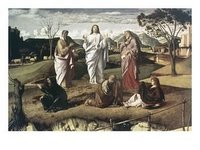
(or Thirty Fourth or Last Sunday in Ordinary Time)
Readings for the Solemnity of Christ the King
Commentary:
Reading I Dn 7:13-14
Perhaps one of the most important features of this reading is the use of the title “Son of Man”. Jesus later borrowed it and it was the most common way he referred to himself. This vision by Daniel was the scriptural link used by Jesus to explain his role in salvation; “the one like a Son of man received dominion, glory, and kingship; all peoples, nations, and languages serve him.”
Responsorial Psalm Ps 93:1, 1-2, 5
R. The Lord is king; he is robed in majesty.
Keeping with the theme of the day, this Psalm is a hymn celebrating God’s kingship. It was he who created the world and he has dominion over all.
Reading II Rev 1:5-8
This vision of St. John of the return of Jesus as King is very straight forward. One of the more significant verses is; "I am the Alpha and the Omega, “says the Lord God, "the one who is and who was and who is to come, the almighty." The Alpha and Omega are first and last letters of the Greek alphabet, these words are used again later in Revelations (Rev 22:13) and were predicted by Isaiah (Isaiah 41:4), a clear reference to Christ’s Kingship.
Gospel Jn 18:33b-37
In St. John’s description of Jesus being interrogated by Pontius Pilot we hear Jesus’ reluctant admission of his kinship. He clarifies that he is not a threat to civil authority, something that Pilot would have been most worried about since attempting to usurp authority from Caesar was treason. His statement; “My kingdom does not belong to this world”, changes the character of the Lord’s kingdom from one of physical monarchy to one of spiritual rule.
Reflection:
A number of years ago I was talking to a young lady from New York City who had come to Ann Arbor to study at the University of Michigan. We were talking about what she was going to day once her studies were finished and I asked her if she was planning on moving back to New York. Her response told me how different things were there – she said that if she did, she would have to be very careful for a while because her “pedestrian reflexes” had slowed down. I asked her what that meant and she told me that if she walked out in the street in “The City” the way she does around Ann Arbor, she would run down by a cabbie for sure.
People from different parts of the country and world behave differently. The rules and laws they grew up with shape the way they behave and react in different situations. The young lady I talked about just now knew that the people who drive cars in New York would not yield to a pedestrian. She told me; “You have to be quick on your feet or you’ll end up in the hospital.” She was probably exaggerating but it emphasizes my point.
Today we are reminded once more that we are subjects of a Kingdom not of this earth but eternal in heaven. As members of this kingdom we are subject to the laws of this kingdom and its ruler, Christ who is King. His law of love supersedes the temporal secular laws we live under as citizens of what ever country to which we belong. His ten commandments are binding upon us even if the legal systems under which we operate does not hold the same values.
The question we must ask ourselves as we contemplate an act of contrition is, if we were brought before the King today, would we be convicted under the laws of the heavenly kingdom? While the Lord’s Kingdom is not of this earth, his Kinship is eternal and we must never forget we are his subjects – now and forever.
Pax








